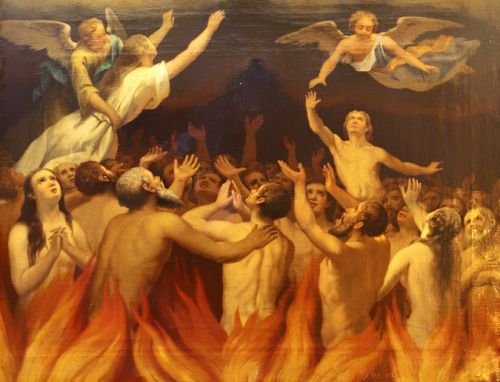“Truly I tell you, you will never get out until you have paid the last penny” ( Mathew 5:26).
If this is true, we should be doubly cautious to repay whatever we owe to others, right in time. It will not be out of place to study the context when Jesus gave this advice. “Come to terms quickly with your accuser while you are on the way to court with him, or your accuser may hand you over to the judge, and the judge to the guard, and you will be thrown into prison” ( Mathew 5:25). Jesus’ advice is applicable to anyone who is on the way to court accompanied by his accuser, and to the presence of the judge. Anyone means everyone and everyone includes you too. If it is you too, then it is me too. Jesus gave this brief but precious piece of advice to each one of us.
As Christians, we are duty bound to account for every penny entrusted to us. Elsewhere, Jesus says that if we are faithful in small things, we will be entrusted with bigger things. Being faithful and accountable is part of our christian identity. So, if you borrow, repay it promptly. But when you lend never expect repayment. Jesus himself said it. Do you think Jesus was poor in economics? No. He is a master economist who advised us to lend freely without expecting repayment, so that we will be repaid in full with interest in the coming life.
Those who have paid their entire dues need not read further. But is there anybody who can claim that he has paid all his dues? Chances are that their numbers are very less when compared to the vast majority of people who have something outstanding in their account book as payable.
We are coming straight to the point. Our discussion is about what we owe to the owner of all wealth, the Almighty God.
We know, Israelites started their relation with God through a kind of contract. God gave them His commandments and in return to the Israelites obeying the commandments, He promised them everything good. Unfortunately, the observance of the Law in its strictest form was not easy for them. Then came Jesus, and he instituted a New Covenant with his own blood. It was the ransom he paid for enabling us to face the just Judge to get a favorable order to enter heaven.
But heaven is only one among the three possibilities, we should understand, the other two being hell and purgatory. Today our subject is purgatory and I think we should start from the Catechism of Catholic Church.
CCC 1022: Each man receives his eternal retribution in his immortal soul at the very moment of his death, in a particular judgment that refers his life to Christ: either entrance into the blessedness of heaven – through a purification or immediately, or immediate and everlasting damnation. At the evening of life, we shall be judged on our love.
CCC 1030: All who die in God’s grace and friendship, but still imperfectly purified, are indeed assured of their eternal salvation; but after death they undergo purification, so as to achieve the holiness necessary to enter the joy of heaven.
CCC 1031: The Church gives the name Purgatory to this final purification of the elect, which is entirely different from the punishment of the damned. The Church formulated her doctrine of faith on Purgatory especially at the Councils of Florence and Trent. The tradition of the Church, by reference to certain texts of Scripture, speaks of a cleansing fire. As for certain lesser faults, we must believe that, before the Final Judgment, there is a purifying fire. He who is truth says that whoever utters blasphemy against the Holy Spirit will be pardoned neither in this age nor in the age to come. From this sentence we understand that certain offenses can be forgiven in this age, but certain others in the age to come.
What the Church teaches us is that immediately after death a particular judgement is happening as a result of which the soul is awarded either eternal bliss or eternal damnation. In the case of eternal bliss, it can be either immediate or through a purification. This stage of purification is intended for those who die in God’s grace and friendship, but still imperfectly purified. The need for purification is that since God is holy we have to be holy to meet Him. It can so happen that a person dies with venial sins for which he couldn’t get absolution through confession. Again there can be those souls who could not do the required reparation for the offences they committed.
The punishment for sin comes in two ways. First is eternal damnation. When we receive the sacrament of confession, we are saved from this eternal punishment. However, the second punishment is on a different footing because it is linked to the reparation of the consequences of our sins. To take an example, suppose somebody attacks another person resulting in his permanent physical incapacitation and consequent loss of earnings. Later on, he repents sincerely about what he did, confesses his sin and gets absolution. In this way he is saved from eternal fire. But he has a duty to restitute what the other person lost by his action, in the instant case his capacity to earn his livelihood.
God desires that the one who deprived another person of his daily bread should compensate for it. It can be by supporting him financially or procuring him a job or sponsoring the education of his children. If he fails in this duty he is liable for temporal punishment which is different from eternal punishment. Only those souls who are absolved of both their eternal punishment as well as temporal punishment are immediately admitted to heaven. Those who are yet to do the reparation in lieu of their temporal punishment are bound to undergo a certain stage of purification , which is called purgatory, before their final entry into eternal bliss.
Having said this, how should we approach this subject? Forget about those who go directly to heaven. They are cleansed of all stains of sin. But for those who are destined to undergo a period of purification, they owe a certain debt to God. It may be the reparation for venial sins committed by him and not confessed or it may be the works of reparation wanting for those sins, which he got absolved in confession. For us, the easiest way is to do the reparation for all our sins, then and there so that our account book before God is squared off at the time of death. But it seldom happens in practice. So the destiny of a large number of people will be purgatory, where they have to undergo the purifying fire for long, long periods. I can imagine a sigh of relief coming from many who read this, because there is something like purgatory, which they can expect though they are not entitled for direct entry into heaven!
My dear brothers and sisters, I request you not to be carried away by the prospects of an easy probation period in purgatory. It is not a comfortable place. We have the testimonies of many saints and seers who had the (mis)fortune of getting a vision of what we call purgatory. All of them say in one voice that what expects us there is unbearable and cannot be compared to anything on earth. A day in purgatory will be like a thousand years on earth. Most important torment of those poor souls detained there is the pain of not being able to unite with God. At the moment of death, the soul wants to return to God from where it originated. But Divine Justice prevents it from approaching God till the purification is completed. It is foolish to take purgatory as something silly and continue our life as it was before. Those who do so might end up at the other door, the one leading to eternal perdition. Why should we take chances? Especially when the road to heaven is still open!.
Moreover, the Church has granted us a precious gift in the form of ‘indulgences’ as a means to get absolved from the liability for temporal punishment. I admit, indulgences has been a hotly debated subject during the past few centuries. Without going into the details, I would call your attention to the promise Jesus gave his disciples; “If you forgive the sins of any, they are forgiven them; if you retain the sins of any, they are retained” (John 20:23). If the Church, as the true heir of the Apostolic anointment can forgive sins, isn’t it logical to think that the Church has the authority to grant remission from the consequences of sin as well?
Sadly, many Christians do not believe in purgatory. They argue that death is the final point upto which we can procure the absolution of sins. If we buy this argument it contradicts what Jesus himself told in relation to the sin of blasphemy against the Holy Spirit. “Whoever speaks a word against the Son of Man will be forgiven, but whoever speaks against the Holy Spirit will not be forgiven,either in this age or in the age to come” ( Mathew 12:32). Jesue clearly teaches us that there is a chance of certain sins to be forgiven in the coming age, which refers to the period after death.
Even before Christ the practice of praying for the dead was prevalent in Israel as evidenced from 2 Macc 12: 42-46. We read that Judas Maccabeus and his people have made atonement for the dead. St Paul also mentions about the practice of receiving baptism on behalf of the dead. These texts from the Scripture support Church’s teachings that there really exists a possibility of remission of certain kinds of sin after death. They are attributed to the devout prayers of the living on behalf of the dead.
I would like to make one thing very very clear. Our goal is heaven for which we should strive hard. In the unfortunate event of some among us failing to qualify in the race to enter heaven directly, then treat purgatory as Plan-B. Plan-A is always heaven. Dying in a state of grace after repaying the debts caused by our sins will make us entitled to heaven. Repaying should be complete and perfect. That is why our Lord teaches us that until we pay the last penny we will not get out. Best ways to repay the debt are by doing works of penance, mortification and reparation. If we withdraw voluntarily from the pleasures permitted to us, it will go a long way in paying our debt accrued due to our wayward life in past years. Fasting and mortification are two best tools in this regard. Holy Communion, Rosary and certain prayers will bring us abundant benefits by way of indulgences. Never waste an opportunity to gain indulgences as we need to square off the account before the last bell.
What about our departed dear ones? We don’t know their final destination. However, it is always wise to pay for the dead on the assumption that they are going through a state of purification in purgatory. Church encourages the believers to pray for those poor souls in purgatory, to the extent of including it as one among the fourteen works of mercy.
Many people offer Gregorian Mass (Holy Mass offered continuously for 30 days) for the dead. Whether you can afford to have a Gregorian Mass or not, it is always advisable to offer every Holy Mass which you attend, for the benefit of your departed ones. Needless to say, every Holy Mass should be offered, first of all, for the forgiveness of our own sins and remission of its punishment, second intention being God’s mercy to pour upon the dead. Prayers for the faithful departed pleases God, who uses our supplications to purify these souls that he loves. It is an act of mercy on our part for those we have known and loved, for those who are not remembered, and for those who have no one else to pray for them.
St Paul writes; ‘May the Lord grant mercy to the household of Onesiphorous, because he often refreshed me and was not ashamed of my chain; when he arrived in Rome,he eagerly searched for me and found me – MAY THE LORD GRANT THAT HE WILL FIND MERCY FROM THE LORD ON THAT DAY!’. From this verse, it is fairly sure that Onesiphorous was no more at the time when Paul wrote it. Wasn’t Paul praying for the soul of Onesiphorous, which again demonstrates the belief of the Church in the existence of purgatory during the past two millennia.
Since the time of Paul many saints including Augustine, Gregory the Great, Bernard, Bede, Jerome, Ambrose, Origen and Bellarmine have affirmed Church’s belief in the existence of purgatory and the need of praying for the poor souls undergoing purification there. We are familiar with the prayer of St Gertrude.
‘Eternal Father, I offer You the most precious blood of Your Divine Son, Jesus, in union with the Masses said throughout the world today, for all the Holy Souls in Purgatory, for sinners everywhere, for sinners in the universal Church, for those in my own home, and in my family. Amen’.
St. Faustina had a vision of purgatory which she narrates in her diary: ‘…I saw my Guardian Angel, who ordered me to follow him. In a moment I was in a misty place full of fire in which there was a great crowd of suffering souls. They were praying fervently, but to no avail, for themselves; only we can come to their aid’. (Diary 20)
Listen what Jesus told St Faustina: “Today bring to Me the souls who are in the prison of Purgatory, and immerse them in the abyss of My mercy. Let the torrents of My Blood cool down their scorching flames. All these souls are greatly loved by Me. They are making retribution to My justice. It is in your power to bring them relief. Draw all the indulgences from the treasury of My Church and offer them on their behalf. Oh, if you only knew the torments they suffer, you would continually offer for them the alms of the spirit and pay off their debt to My justice”(Diary 1226).
Accordingly, Faustina wrote the following prayer: ‘Most Merciful Jesus, You Yourself have said that You desire mercy; so I bring into the abode of Your Most Compassionate Heart the souls in Purgatory, souls who are very dear to You, and yet, who must make retribution to Your justice. May the streams of Blood and Water which gushed forth from Your Heart put out the flames of the purifying fire, that in that place, too, the power of Your mercy may be praised. Eternal Father, turn Your merciful gaze upon the souls suffering in Purgatory, who are enfolded in the Most Compassionate Heart of Jesus. I beg You, by the sorrowful Passion of Jesus Your Son, and by all the bitterness with which His most sacred Soul was flooded, manifest Your mercy to the souls who are under Your just scrutiny. Look upon them in no other way than through the Wounds of Jesus, Your dearly beloved Son; for we firmly believe that there is no limit to Your goodness and compassion” (Diary 1227).
During the apparitions at Fatima, Our Lady, after giving a vision of the hell, taught the children a special prayer which was later incorporated into the Rosary after every mystery: ‘O my Jesus, forgive us, save us from the fire of hell. Lead all souls to heaven, especially those who are most in need’. Who are those most in need other than those poor souls imprisoned in purgatory!
Having said this, do not forget to strive hard to pay all our debts – until the last penny – when we are still alive and when there is enough light around. Because night will soon befall us of which our Lord has warned. ‘Night is coming when no one can work’ (John 9:4). What is the point in carrying over your debts to another life of which we know pretty little!
Our request to all our readers is to have a thorough examination of conscience and if you find out that you owe even a penny, take a firm decision to see that it is paid off in this life itself through prayer, penance, mortification and reparation or through indulgences. Be wise not to carry the unnecessary baggage of old debts while you approach the threshold of the New Heaven and New Earth. Meanwhile do pray for those departed souls, who are going through the agony of purifying fire in purgatory. Be merciful to them with our prayers so that the Father will also grant us His mercy.
Let us pray:
Let the souls of the faithful enter into Heaven by the mercy of the Lord.
Eternal Father, by the precious blood of Christ, have mercy on them.
1 Our Father, 1 Hail Mary, 1 Glory be

















